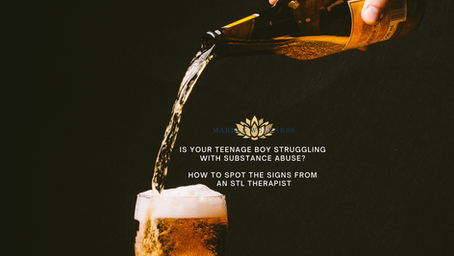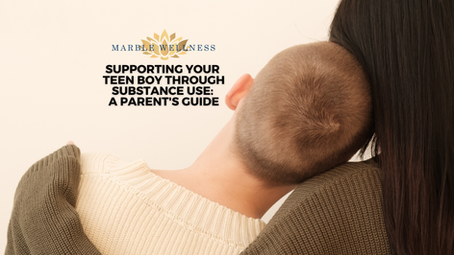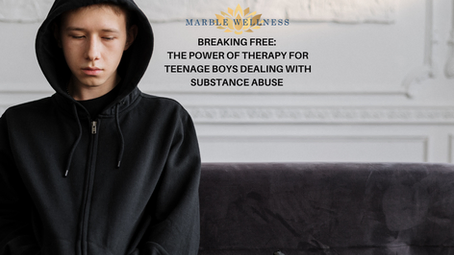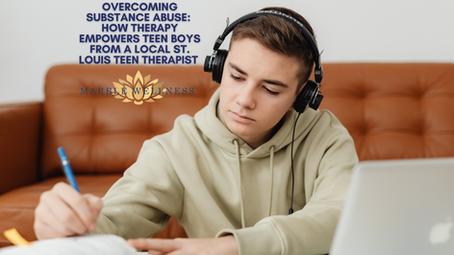
Hey there, parents and caregivers!
Being a mental health clinician, I understand that raising teenagers can be both rewarding and challenging. As your kids grow up, they face various pressures and temptations, including the potential risk of substance abuse. It’s essential to stay vigilant and aware of any signs that your teenager may be struggling with substances.
To help raise awareness, we’ve recently published blogs on this topic, including the power of therapy for teenage boys struggling with substance abuse; ways parents can support their teens; and how mental health support is an important part of overcoming substance abuse.
In this blog post, let’s explore how you can detect if your teenager, teen boy in particular, has a substance abuse problem, so you can provide the support they need to navigate these challenging waters.
Here are 9 Signs to Look For If You Think Your Teenage Boy is Struggling with Substance Abuse
1. Changes in Behavior
One of the first signs that something might be amiss is noticing significant changes in your teenage boy’s behavior. Keep an eye out for sudden shifts in their personality, such as becoming withdrawn or unusually secretive.
They may also experience extreme mood swings, showing bursts of anger or sadness without apparent reasons. Unexplained irritability and hostility towards family members or friends can also be a red flag.
2. Decline in Academic Performance
We know it’s been summer (and a HOT one here in St. Louis!) but think back to last school year. If your teenager’s grades suddenly start slipping, it could be a sign of substance abuse. For the upcoming academic year, pay attention if they seem disinterested in school or frequently miss classes. Substance use can impair memory and concentration, making it difficult for them to perform at their best academically.
3. Neglecting Responsibilities
A noticeable change in your teenage boy’s sense of responsibility can be a cause for concern. If they start neglecting household chores, avoiding commitments, or showing a lack of interest in extracurricular activities they once enjoyed, it might be worth investigating further.
(What that further probing looks like will come soon, in a blog for parenting teenagers who might be dealing with a substance abuse issue.)

4. Physical and Health Changes
Substance abuse can take a toll on a teenager’s physical appearance and health. Keep an eye out for sudden weight loss or gain, bloodshot eyes, dilated pupils, or unexplained bruises or injuries. Additionally, persistent coughing or a runny nose might indicate substance use. (Could be hard with those seasonal allergies that always abound in St. Louis, but pay attention to your parent gut. It’s well-trained!)
5. Changes in Friend Circle
Friends play a significant role in a teenager’s life. So, so significant. (And this is actually developmentally normal, so don’t fret reading this. We can cover that in a future segment–how to worry less about the company your teen is keeping. But for now, let’s stay focused on teenage boys and substance abuse.) If you notice your teen distancing themselves from old friends and hanging out with a new, potentially risky crowd, it could be a sign of substance involvement. Peer influence can be powerful, so it’s crucial to pay attention to their social circles.
6. Missing Valuables
Substance abuse can lead to financial strain, causing your teenager to resort to stealing money or valuables from the household or others. Missing items without an explanation might indicate that they are struggling with substance-related issues.
This can be an especially hard one to “admit” to as a parent, especially if the valuables go missing from a different family member’s house or from a neighbors. But even from your own bathroom or closet where you might keep jewelry, extra cash, or maybe an emergency credit card. There’s something that carries an extra “punch in the gut” when this is the sign you recognize.
That’s partially because money is SO emotional for so many people, and also because this sign of substance abuse is so well-documented–in movies; books; TV series; and the like. If it happens in your house, it can sometimes be the thing that makes you shut down the possibility of the substance abuse issue in your head, even though your gut is shouting at you.
7. Lying and Secrecy
Teens dealing with substance abuse may resort to lying and being secretive to cover up their behavior. They may make excuses for their actions or whereabouts, making it challenging to trust their words.
This one can be tough, because teenagers, teenage boys specifically, aren’t exactly known for being chipper with their parents. But like the tips above, pay attention to a change in behavior. The differences, although subtle, might be undeniable once you start raising your awareness through the lens of “what is different?”
8. Drastic Changes in Appearance
A sudden and drastic change in your teen’s appearance, such as neglecting personal hygiene, wearing long sleeves in warm weather to cover up marks, or constantly looking unkempt, could be signs of substance abuse.
This one is also hard sometimes because teenage boys aren’t necessarily blowing away their parents with how great their personal hygiene is, especially in those initial teenage years. Again, pay attention to differences. Or pay attention to what doesn’t make sense. Long-sleeves in the summer, especially a St. Louis summer, is a great example. Or maybe your son always used to take care to comb his hair and spray some cologne on the weekends, because he was meeting his girlfriend, and suddenly he’s not doing that anymore. Tune in and see what you notice.
9. Unexplained Disappearance
If your teenager starts sneaking out of the house or frequently disappearing without a reasonable explanation, it’s essential to address this behavior. They might be engaging in risky activities related to substance use.

As parents and caregivers, it’s crucial to be attentive and proactive in supporting your teenager’s well-being. Detecting early signs of substance abuse can make a significant difference in their journey to recovery and healing.
Remember, if you suspect your teen is struggling with substance abuse, approaching the situation with love, understanding, and empathy is vital.
Seek the help of a mental health professional or counselor to guide you through this process and provide the support your teen needs. Together, we can navigate these challenges and empower our teenagers to make healthy choices for their future.
About the Author
Skyler Martin is a therapist at Marble Wellness. He works with teens, adult men (especially dads!), and really enjoys family therapy. Skyler worked for 7 years at Ozark Teen Challenge, a rehabilitation center for teenage boys, and did specialized work in substance abuse with the teenagers he worked with there. Additionally, he has worked with adults with substance abuse issues at Places for People, a premier nonprofit agency in St. Louis, for over a year. He brings a wealth of knowledge and experience to his therapy work.
Reach out today if you would like to get scheduled and to start working with Skyler. Whether he can help you as a parent with ways to cope yourself and also intervene and support your son, or if you want to have your son start therapy with Skyler, he’s ready to get started! It can be a gift for your teenage boy to experience life beyond substance abuse.
Start Therapy for Mental Health in St. Louis
If you live in St. Louis and are ready to improve your mental health, we are here to help.
Contact Us!

Additional Counseling Services at Marble Wellness in St. Louis, MO and Chicago, IL
Counseling services designed to help set you on a path of living a more fulfilled, calm, and happy life.
St. Louis
Our St. Louis team of therapists have a variety of training backgrounds and areas of expertise. We specialize in anxiety, depression, grief, chronic illness, therapy for men, couples, and maternal overwhelm. We can also help new moms with various postpartum concerns, moms in the thick of parenting, and moms with teens. We can also chat from wherever you are in the state with online therapy in Missouri and online therapy in Illinois. No matter where you are in your journey, we would love to support you.
Chicago
Our Chicago team of therapists offer a wide range of mental health services to help our clients through the different challenges and hurdles in their life. In addition to anxiety, depression, grief, therapy for men, and maternal overwhelm, we are specialized in professional burnout, therapy for breakups, and love partnering with working moms.



